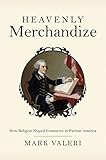Heavenly merchandize : how religion shaped commerce in Puritan America / Mark Valeri.
Material type: TextPublication details: Princeton : Princeton University Press, ©2010.Description: 1 online resource (xiii, 337 pages) : illustrationsContent type:
TextPublication details: Princeton : Princeton University Press, ©2010.Description: 1 online resource (xiii, 337 pages) : illustrationsContent type: - 9781400834990
- 1400834996
- 9786612569203
- 6612569204
- Puritans -- Doctrines -- History -- 17th century
- Puritans -- Doctrines -- History -- 18th century
- United States -- Religion -- To 1800
- Puritans -- Influence
- Business -- Religious aspects -- Christianity
- Puritains -- Doctrines -- Histoire -- 17e siècle
- Puritains -- Doctrines -- Histoire -- 18e siècle
- États-Unis -- Religion -- Jusqu'à 1800
- Puritains -- Influence
- Affaires -- Aspect religieux -- Christianisme
- RELIGION -- Christianity -- Presbyterian
- SOCIAL SCIENCE -- Sociology of Religion
- Business -- Religious aspects -- Christianity
- Puritans -- Doctrines
- Puritans -- Influence
- Religion
- United States
- Puritanismus
- Handel
- Wirtschaftssoziologie
- USA
- Marktwirtschaft
- Puritaner
- Religion
- Marktwirtschaft
- USA
- To 1800
- Geschichte 1600-1800
- 285.9 22
- BX9323 .V35 2010eb
- online - EBSCO
- QF 562
- QV 200
| Item type | Current library | Call number | URL | Status | Notes | Barcode | |
|---|---|---|---|---|---|---|---|
 eBook
eBook
|
Biblioteca "Angelicum" Pont. Univ. S.Tommaso d'Aquino Nuvola online | online - EBSCO (Browse shelf(Opens below)) | Online access | Not for loan (Accesso limitato) | Accesso per gli utenti autorizzati / Access for authorized users | (ebsco)321424 |
Browsing Biblioteca "Angelicum" Pont. Univ. S.Tommaso d'Aquino shelves, Shelving location: Nuvola online Close shelf browser (Hides shelf browser)
Includes bibliographical references and index.
Print version record.
Cover; Title; Copyright; Contents; List of Illustrations; Preface; INTRODUCTION: Heavenly Merchandize; CHAPTER ONE: Robert Keayne's Gift; CHAPTER TWO: Robert Keayne's Trials; CHAPTER THREE: John Hull's Accounts; CHAPTER FOUR: Samuel Sewall's Windows; CHAPTER FIVE: Hugh Hall's Scheme; EPILOGUE: Religious Revival; Notes; Index.
Heavenly Merchandize offers a critical reexamination of religion's role in the creation of a market economy in early America. Focusing on the economic culture of New England, it views commerce through the eyes of four generations of Boston merchants, drawing upon their personal letters, diaries, business records, and sermon notes to reveal how merchants built a modern form of exchange out of profound transitions in the puritan understanding of discipline, providence, and the meaning of New England. Mark Valeri traces the careers of men like Robert Keayne, a London immigrant punished by his chu.









